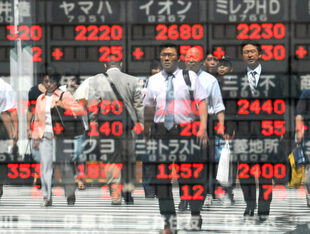hankyoreh
Links to other country sites 다른 나라 사이트 링크
US subprime crisis likely to have limited impact on S. Korea

There are signs that the U.S. subprime mortgage crisis will spread to the global financial market, and it is highly possible that it will also have a negative effect on the South Korean economy. Combined with the central Bank of Korea’s move to raise the inter-bank interest rate, it has affected both domestic share prices and real-estate prices and could weaken consumer sentiment. If the U.S. subprime crisis has an impact on domestic exports, domestic economic recovery could also be delayed.
On August 10, stock prices and the bond interest rate fell sharply and the exchange rate was hiked. The government closely monitored the local financial market, and the Ministry of Finance and Economy and the BOK held an emergency meeting. The government will hold a conference on August 13 to prepare new measures against the crisis.
The BOK said, “If the call rate rapidly changes, we will swiftly cope with the situation through open-market operations.”
Domestic financial institutions are not likely to be seriously affected by the U.S. subprime mortgage crisis. The Financial Supervisory Service estimates that local lenders’ investments in bonds related to subprime mortgages amount to 800 billion won (US$861 million). Considering the size of local lenders’ assets, they will not be hit seriously, according to the FSS.
The problem is that if the international financial market is affected by U.S. subprime mortgage loan defaults, it is likely to influence the local market. With a worldwide tendency to prefer safe assets, the local stock market is turning bearish. The won-dollar and won-yen exchange rates are expected to rise for a while due to the weak currencies of the emerging markets and the strong dollar.
Seo Yeong-ho of JP Morgan in Seoul said, “The volatility of the financial market is likely to surge. Whenever the U.S. subprime mortgage issue emerges, share prices inevitably drop.”
Experts worry that the subprime mortgage issue could hit the local economy as well.
As shown by the BOK’s call-rate hike on August 9, the central bank thinks that the current U.S. situation will not be an obstacle to local economic growth. Kim Jae-chun, head of the BOK’s Research Department, said, “The situation is not so serious as to depress the U.S. economy and other nations such as Europe and China are economically healthy. The possibility is low that it will affect the local economy.”
If the subprime mortgage issue spreads worldwide, reducing liquidity and causing sluggish demand, exports that have been the driving force of local economic recovery will slow.
There are also a series of negative factors in local consumption. As the BOK has increased the call rate by 0.25 percentage points, the mortgage loan interest rate is closing to 8 percent, increasing the interest burden for local households. Real-estate prices have dropped slightly, but they could steeply decline during the second half. If stock prices do not recover, consumer sentiment could also begin to cool.
So Jae-yong at Hana Daetoo Securities said, “If the current bearish market continues, consumer sentiment will shrink significantly.”
The local economy, which has shown indications of recovery due to strong exports and a gradual pick up in consumption, could face hurdles in the future if global markets continue to follow the course of the U.S. subprime crisis.
Editorial・opinion
![[Column] Season 2 of special prosecutor probe may be coming to Korea soon [Column] Season 2 of special prosecutor probe may be coming to Korea soon](https://flexible.img.hani.co.kr/flexible/normal/500/300/imgdb/original/2024/0426/3317141030699447.jpg) [Column] Season 2 of special prosecutor probe may be coming to Korea soon
[Column] Season 2 of special prosecutor probe may be coming to Korea soon![[Column] Park Geun-hye déjà vu in Yoon Suk-yeol [Column] Park Geun-hye déjà vu in Yoon Suk-yeol](https://flexible.img.hani.co.kr/flexible/normal/500/300/imgdb/original/2024/0424/651713945113788.jpg) [Column] Park Geun-hye déjà vu in Yoon Suk-yeol
[Column] Park Geun-hye déjà vu in Yoon Suk-yeol- [Editorial] New weight of N. Korea’s nuclear threats makes dialogue all the more urgent
- [Guest essay] The real reason Korea’s new right wants to dub Rhee a founding father
- [Column] ‘Choson’: Is it time we start referring to N. Korea in its own terms?
- [Editorial] Japan’s rewriting of history with Korea has gone too far
- [Column] The president’s questionable capacity for dialogue
- [Column] Are chaebol firms just pizza pies for families to divvy up as they please?
- [Column] Has Korea, too, crossed the Rubicon on China?
- [Correspondent’s column] In Japan’s alliance with US, echoes of its past alliances with UK
Most viewed articles
- 1Samsung subcontractor worker commits suicide from work stress
- 2‘We must say no’: Seoul defense chief on Korean, USFK involvement in hypothetical Taiwan crisis
- 3[Editorial] Korea’s surprise Q1 growth requires objective assessment, not blind fanfare
- 4Division commander ordered troops to enter raging flood waters before Marine died, survivor says
- 5Is Japan about to snatch control of Line messenger from Korea’s Naver?
- 6No good, very bad game for Korea puts it out of Olympics for first time since 1988
- 7US overtakes China as Korea’s top export market, prompting trade sanction jitters
- 8N. Korean delegation’s trip to Iran shows how Pyongyang is leveraging ties with Moscow
- 9Korea’s 1.3% growth in Q1 signals ‘textbook’ return to growth, says government
- 10[Column] Season 2 of special prosecutor probe may be coming to Korea soon